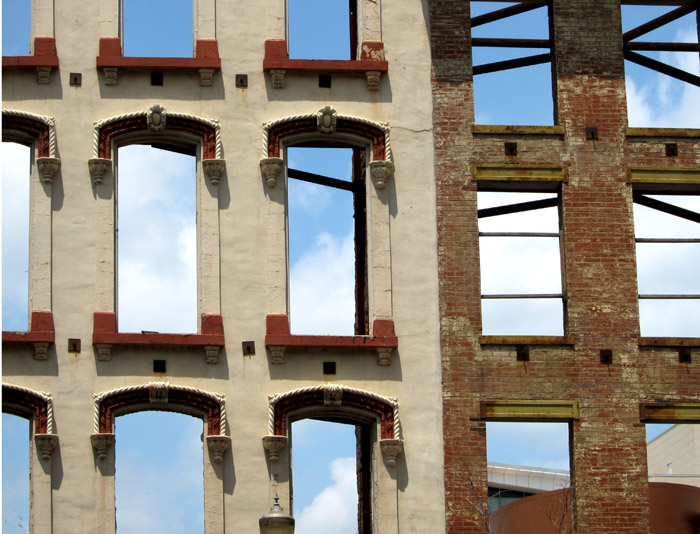
Everything Is Broken
by John Shirley

“Streets are filled with broken hearts, broken words never meant to be spoken—Everything is broken” —Bob Dylan
How long had they been driving? Five hours?
Russ’s dad had picked him up at the San Francisco airport, and they’d started driving north in the old Volvo immediately, heading for a little town on the coast. The town was called Freedom, not to be confused with the older town called Freedom, California, that lay a hundred miles south of here. The new “Freedom” was a dawdling hamlet that had taken on the name to make some kind of stupid-ass statement. Russ had never been there. The road, clinging to the cliffs over the sea, was making him sick to his stomach, with all the curves. And Russ had to pee.
He didn’t want to be a baby about it and complain. Probably his dad already thought he was kind of lame, about to turn twenty-one and still living at Mom’s house, back in Akron. Then mom says she’s kicking him out, gets dad to take him in. Even lamer. “Start over fresh in California,” she says. What is this, 1850? No, it was 2019, mom.
They had Karen for comparison. His sister, just two years older, was a sharp contrast: a star academic at Brown; a graduate research assistant. Russ had two years vaguely majoring in English with a concentration in American Literature at the University of Akron, and not much to show for it, except he’d read a lot of Steinbeck and Fitzgerald and...some Melville.
Why should he care what his old man thought? His father had moved away from Ohio, come out to California—and why? Dad kind of lost his right to judge him, when he moved out, didn’t he?
Only, he was in his dad’s pocket right now. He was broke and his dad had paid his way out here, claiming there was a landscaping job waiting in the new Freedom. Okay, he’d stay with his dad for a while. Didn’t mean he was a loser.
Not that his dad had ever called him a loser. But “Your life has no direction” was more or less the same, wasn’t it? Last time they’d had that talk, on the phone, it had been like:
RUSS: Dad, what direction have you had? Wandering around the country...
DAD: I wasn’t wandering, I went where the work was. I have a degree. I have a job.
RUSS: Degrees are meaningless now. I need to find something that matters to me. I don’t want to just survive.
DAD: You think nothing matters to me?
RUSS: I didn’t say that. But you moved out of state. So...
DAD: You don’t know all the facts, Russ—you don’t know what really matters. That’s where you’re confused...
Russ had made an excuse and gotten off the phone. Then things got bad with him and Mom, and six weeks later, here he was.
And he still had to pee. “Dad? Is there a rest stop?”
“We’re only about twenty minutes from Freedom…”
Russ crossed his legs more tightly. “Twenty minutes from getting out of this car. That’ll be freedom, all right.”
He glanced at his dad to see if the remark had annoyed him. But Dad was smiling. He was a broad-bodied, tanned, solid man of medium height, stiff brown hair speckling gray; a man who liked outdoors stuff, was reading a biography of Thoreau, wore thick plaid shirts that Russ associated with lumberjacks. His dad was a long way from being a lumberjack, but he was a contrast to his gangly, pale son, who’d gotten his mom’s jet-black hair and brown eyes. Dad liked Hank Williams, 1950s rockabilly, country swing, and folk; Russ liked ironic punk-styled bands—and the smarter hip-hop, like Immortal Technique and Aesop and Juji. Dad liked baseball; Russ hated sports. Dad didn’t drink; Russ liked to get smashed with his friends. That was something he might have inherited from his mom, too. Never an obvious alcoholic, she was irritable, in the evening, before getting a couple drinks inside her.
Russ missed his mom and he didn’t miss her, at the same time.
“There’s a wide spot up there,” Dad said, suddenly. “You need me to pull over?”
“For sure.”
Dad pulled over in a wide graveled place in the road and Russ got gratefully out of the musty car, into fresh air and room to move, the small muscles in his legs twitching with the stretch.
He walked a short ways into the fir trees, picked a spot behind a tree. The spot smelled, pleasantly and sharply, of the conifer needles dropped around its trunk. Douglas fir? he wondered, as he peed against the trunk, admiring the patterns of bright green lichen—and a small tree frog, like something carved from emerald, clinging just above the roots. “I’m being careful to miss you, little dude,” he said. “But avoid this side of the tree for awhile.”
Halfway back toward the car Russ stopped, just standing there, feeling the ground ripple under him; hearing a distant rumble.

What was that? Big breakers, in a sea cave under them? The car was just a hundred feet or so from the edge of a seaside cliff.
Russ hurried back to the car, feeling nervous, unsure why. But noticing the flocks of sea birds flying inward, from the sea, not far overhead; hearing their brassy collective noise. The birds looked like they were in a hurry, something frantic about their winging; their clamoring, piercing calls.
The wind picked up, ruffling his long black hair, making the tip of his prominent nose tingle. He sniffed, wondering, as he got back into the car, if he was getting a cold.
“Feel better?” Dad asked, looking in the side mirror at the road. Jerking the car back on the highway with the abruptness that so annoyed Mom, ten years before. Dad said it was “decisive” driving.
They’d fought about that, her and Dad; about lots of things, but especially, where to live. Their house had been flooded twice, in Akron, since the global warming rainstorms got so overwhelming. Dad had wanted to move away from Akron, find someplace rural in California or Oregon. “Somewhere a person can stretch out and breathe,” he’d say.
Russ had been eleven when his parents had broken up: Dad insisting his mom quit drinking; Mom deflecting the drinking issue by claiming he was having an affair. After the divorce, one night, when she was in fact a little drunk, she admitted to Russ that “Dad’s affair” had probably been in her imagination. That little revelation struck Russ hard, right in the pit of his stomach. He’d been sympathizing with Mom, had taken her side. Then it turned out her “imagination” had wrecked the marriage and damaged his relationship with Dad.
Life went on. Dad worked for two years more in Akron, then saw his chance to move to California. He’d taken a job teaching civics with a community college in Santa Clara. The teaching gig eventually ended—Russ had never been clear if Dad had lost the job or quit—and now he had some kind of county statistics job up here, in Deer Creek, and he was just getting by. He had to commute inland from Freedom for above an hour to get to the office.
“You know, this Freedom’s got its peculiarities,” Dad said, glancing out his window at another noisy flight of birds heading inland. “The town I mean. I guess you they changed the name of the town about six years ago. It used to be called Ferry Landing. The town had a ferry, of sorts, long time ago, that went up and down the coast from there, like to Buried Cove and Molly’s Harbor...
“How come they changed the name?” Russ asked. “I never understood that.”
“Oh, that’s a long story. Basically…” Dad twisted about in his seat, trying to get more comfortable, audibly cricking his neck. “Basically, it was Lon Ferrara’s idea.”
“Ferrari, like the car?”
“No, Ferrara. Mayor of the town. He owns like four businesses in the area—maybe five or six, I lost count. And he’s cagey about it—hates paying taxes. Well hell, maybe it really is a matter of principle to him, his whole trip with taxes. He says it is. He’s a hyper libertarian—tied in with that teabagger bunch. He’s the local Tea Party chairman. Likes to quote that line of Reagan’s, ‘government doesn’t solve the problem, it is the problem’. Talks about freedom but he pushes his employees into voting a certain way—and thanks to him the town’s gotten rid of the local property taxes and bonds. He calls it the Decentralization Movement. The schools in the area are cut way back, they’re barely functioning.”
“Not that many public schools left anywhere,” Russ pointed out. “Privatization of schools, that whole thing—”
“Yeah, and how’s that working for people? They cut costs, hire the worst teachers...We were supposed to have a privatized fire department here. Never materialized. Mayor sold the trucks we had to pay for the Old Town decorations. And—he hassled people into voting the town a new name. That’s how we got ‘Freedom’!” Dad shook his head in disgust. “I wrote a letter to the Ferry Courier, complaining we didn’t have the freedom to say no to naming the town Freedom. They didn’t print the letter, naturally—Ferrara owns the Courier. Which is now called the Freedom Courier.”
Russ snorted. “They’re not, like, skilled at picking up on irony.”
Dad chuckled. “You got that right.” He took another curve, and added, “You know, the Libertarians pulled off a win on that Supreme Court case in 2018 and the county’s been going to hell in a handbasket since. Amongst other things, they’ve gotten rid of emergency services, dumped search and rescue in this area—gotten rid of all the cops but two! One and a half, really—one sheriff and a kind of town patrolman up in Buried Cove. And the Buried Cove patrolman is mostly volunteer. He gets paid for maybe six hours a week. I mean, that’s all there is for like a hundred miles up and down the coast—you got to go almost seventy miles east to Deer Creek to find any more cops. Ferrara’s bunch discourage CHP coming around.”
“No speeding tickets! That so bad?” He’d gotten in big trouble piling up speeding tickets and not paying them.
“If somebody steals your car there’s nobody to look for it, son. I mean, we’ve tried to do some stuff, like get people to help clean up the beaches, but...” Dad shook his head. “Hard to keep up. Trash all over it now. No maintenance. Punks running wild…”
“Hey, whoa, what’s wrong with punks?”
His dad grinned. Russ had been in an Akron neo-punk band. “Not those kind of punks.”
“I was just playin’. You mean the uh...”
“Yeah the drug dealing, thieving kind. Hey check it out—up ahead, that’s Seaward Road. It’s a highway, really. We go east on Seaward and then turn right on Ferry Lane…And we’ll be home. My apartment. Not much, but it’s warm. Just a block from the new apartment building I got you the landscaping work on, right down the street from us.”
They passed a sign:
WELCOME TO
FREEDOM, CALIFORNIA
Pop. 1200
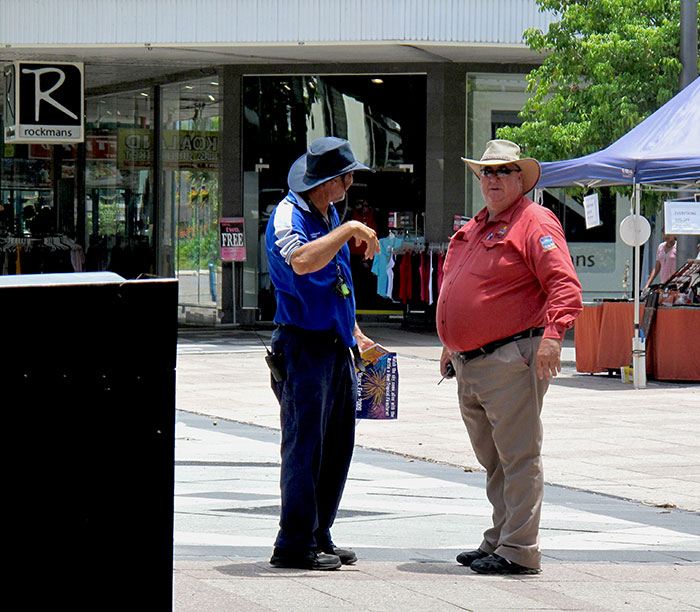
Lon Ferrara was holding court in The Bobbing Buoy Bar and Barbecue when Jenkins first started yelling about the advisory. Ferrara stood at the end of the bar, one boot on the old fashioned brass foot rail, facing half a dozen bar customers, five assorted men and one woman. He was hoisting a schooner of Doublehit from his own microbrewery up in Buried Cove, slopping some on the bar as he gestured in emphasis. “Privatization is efficiency!” he said, trying to ignore Old Jenkins. The haggard, white-bearded old man had worked for the government meteorological station for seventeen years, though he was no meteorologist himself–just a drunken retiree, really, at this point. Jenkins was stumping up and down the wooden sidewalk outside, pausing to wave his aluminum cane, bellowing about the warning he’d gotten on the internet at the senior center, and how Monterey and Santa Cruz were on some kind of advisory or “seismic alert” or some fucking thing. Christ, Monterey and Santa Cruz were a long damn ways south of here, down past San Francisco, what’s that have to do with their fine new Freedom?
“Privatization is efficiency,” Ferrara repeated, liking the phrase, looking around with satisfaction at the old fashioned bar; sawdust on the sagging wooden floor, dark wood trimming around the high, patterned-tin ceiling. A hundred thirty years old, this place—a monument to the 19th century’s way of doing things. Make your own rules. “Privatization changes everything,” Ferrara went on. “No government waste. No inflated bureaucratic wages. And if we want fire fighter services that’s how we’ll get them. We’ll get our emergency services—they’ll be privatized. I’m working on that one...” Ferrara was a big-shouldered man with short legs and a long, heavy torso, dyed dark brown hair—the most difficult-to-spot hair plugs money could buy. He had dark, quizzical eyes, a tweedy blazer. “But to make it happen right you need competition for the service! Competition is practically synonymous with efficiency!”
“Synonymous,” Hilly said, nodding, one hand combing his iron-gray beard, his rheumy eyes flicking questioningly at his whiskey glass. Like he was wondering how it had emptied itself.
Mario Ferrara, the bartender, an older, jowlier, aproned version of his brother Lon, came over with a bar towel and sopped up the ale without comment. Lon could slop all of the beer in the place, if he wanted. He owned the bar, and nearly owned his brother, too, at this point.
“If competition makes for efficiency,” Jill said, “then how come there’s never any competition when private companies take over public services?” Jill Hushbeck was a willowy woman with gray streaks showing in her long, straight dark-blond hair; her hazel eyes were difficult to see behind her thick glasses. She was almost legally blind without those heavy-duty specs. But Ferrara could feel her watching him attentively. Waiting to get the rhetorical jump on him. “There’s just one company taking over—usually pre-arranged—and no one to compete with them once they’ve started.”
“Well, Jill… I’ll tell you…” He paused to look her over. Hard to read her face behind those Coke-bottle glasses.
They’d gotten in a lot of debates, him and this woman, last time he campaigned for mayor—to Ferrara she stood for the shrinking Old Guard liberal element around town. Which was why he’d eased her out of the editorial job at the newspaper. Now she worked full time trying to sell real estate and she was barely hanging on in this market.
But despite the thick glasses, she was an attractive woman; a tall woman in her forties, she filled out the black turtleneck sweater and those designer jeans nicely. Her long, delicate fingers toyed with the stem of her glass, swirling her chardonnay. He’d never seen her drink two glasses of wine in one sitting.
Like to get in there, he thought. Get a piece of that.
But she’d never go for it. Maybe he could make some kind of real estate deal for her, maybe that’d make her more pliable. But he doubted it, even then. Anyway, his wife had moved out, gone to live in Monterey with her sister, was plotting a divorce, and he didn’t want to give Wilamina any ammunition to use against him in court. He’d lose too much money if she got the divorce she wanted. He was already over extended.
“I’ll tell you what, Jill,” Ferrara said at last, “I don’t know what sources of information you’re trusting, but privatization has got to be more efficient. It’s in the nature of things.”
“Around here—who are we supposed to get to be the privatized fire control company, Mayor? Your company, that’s what we’ll get—no one else around to do it. Where’s the free-market competition for that?”
“Heh, she got you there,” Mario said, chuckling. “She…”
Ferrara shot his brother a glare and Mario, realizing he was risking his meal ticket, shut up quick—Mario owed his brother about sixty thousand dollars. Lon had bought out Mario’s failed night club, in North Beach. Sold it, and paid off his debts.
“You’re just misinformed, Jill…” He paused, feeling the floor shivering under him. What the hell was that buzzing in the floor? Termites?
“Gotta stay informed, stay on the smart side,” Hilly said loyally, vigorously nodding, toying significantly with his empty glass.
Ferrara ignored him, not in the mood to be nudged into buying Hilly’s drinks. “The fact is…”
He broke off, frowning, as Old Jenkins stumped by the window again, then paused to bang on it with the rubber tip of his cane.
“You people listening in there?” Jenkins yelled, his voice muted by the window. “We got an advisory!”
“You break that window you’ll pay for it Jenkins!” Ferrara boomed back at him. “Senile old prick.”
Some of the others laughed. Jill put her wine glass down, crossed to the front door, peered out, shading her eyes from the lowering sun.
“What’s going on, Mr. Jenkins?” she asked.
He nattered something back at her, Ferrara caught the words warning, evacuation. Earthquake. Global warming clustershake...”
“What horseshit,” Ferrara said. “Back to this global warming nonsense.”
Mario opened his mouth like he was going to argue—they’d lost some beachland to the sea rising right here, it was true, the beach was narrower than it used to be; the cliffs a little shorter. Then there was the crazy weather variance around the world. So what—global warming could be a natural cycle for caused by sunspots—you get some variation.
“I heard those clustershakes around the oceans are a real thing,” Mario said, shrugging. “Just saying.”
“The whole idea that global warming could trigger earthquakes, tidal waves and shit—” Ferrara laughed. “—makes no goddamn sense! What’s one got to do with the other?”
Jill came back into the bar, chewing a lip worriedly. “Mr. Jenkins is pretty certain there’s an advisory for this part of the coast...”
Ferrara rolled his eyes. “Like we wouldn’t have heard. Okay, Mario, put on the television.”
Mario nodded, used a remote to switch on the television over the bar. It got its feed from a satellite and right now it was showing a rugby game. Mario had a thing about rugby.
“No emergency broadcast on there,” Ferrara observed. “You see? Gimme another Doublehit, Mario…and what the hell, another drink for Hilly…”
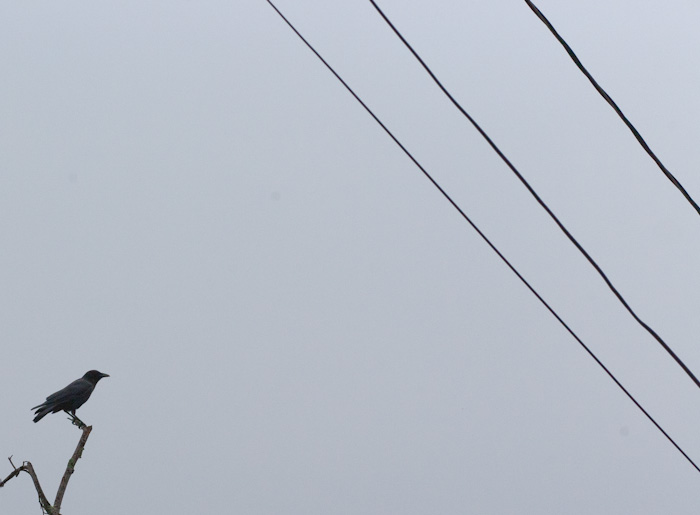
Russ was leaning on the redwood railing of the apartment’s balcony, looking down at the town of Freedom and the sea beyond. Dad’s building was all the way on top of the highest hill around. The air did seem clean, bracing, aromatic here. Smelling of brine, and wood smoke, and the fallen leaves under the oaks flanking the apartment building.
There were binoculars on the railing—Dad was a birder—and Russ picked them up, thinking he’d look out to sea, but he held the binoculars against his chest, just looking around…
Two hills overlooked the sea, which was a bit more than a quarter mile away; the higher hill to the north, Russ’s right, was ringed with old wooden houses, along a winding street—an almost ziggurat effect—set off by those seaside trees that seemed to lean back from the ocean, spruces shaped by years of exposure to the steady wind so they were sculpted like bonsai. A saddle dipped, where Seaward Road passed between the two hills. Ferry Lane circled south from Seaward, to the lower hill, with newer apartments and condos. Dad said a lot of them were owned by Lon Ferrara.
“Hi,” said a girlish voice below. “So you got here.”
Russ looked down to see a young woman or maybe an older teenager, with a tanned, heart-shaped face, sunglasses pushed back over her spiky honey-colored hair. A dark green sweatshirt, Army fatigue pants, Doc Marten boots. Even at this distance he could see the sharp blue of her eyes.
“What’s up,” Russ said, casually, hoping that sounded cool without trying to sound cool. “Got here—uh, yeah we got here.” That didn’t sound cool. He wished he still smoked—better to have a cigarette in his hand right now, instead of binoculars.
“My grandma pointed you out, she knows your Dad. If your dad is Drew Haver...”
“Yeah.”
“‘kay, well, I’m supposed to invite you guys to have dinner, some kind of veggie stew. I think she sent me so we could meet, which is, kind of, you know, lame.” The girl shrugged. “But I don’t know anyone around here. She worries about it. Wants me to make friends. My Gram’s really nice, it’s hard to tell her no. But she’s a vegetarian. So it’ll be, like, all tofu.”
“Oh.” Her grandmother had put her up to talking to him. He’d hoped she’d talked to him on her own initiative.
Another flock of birds passed raucously over, heading inland. “There go some more,” she said. “Birds have been coming in, like there’s a big storm out there. I felt the ground shaking too. There was something on the radio…” She frowned.
“What kind of something?”
“I don’t know, it got fuzzy, something about Monterey and seismic advisories. Makes me nervous, I grew up in San Francisco.”
“Yeah? Supposed to be a great place to live.”
“It’s not so great. Earthquakes. Two since the clustershakes thing started. Not that big but—got kinda ugly. And it’s expensive. And, you know—people get shot. I was living in the Potrero, though, that’s pretty tight. But then my mom died, and my dad was already dead, so I came to stay with my Gram. What you looking at with those binoculars?”
“Um—nothing yet. Not even sure how to use ‘em.”
“You having the stew?”
“I’ll ask my dad if he… I mean, you know, probably. Um—I’m Russ.”
“Oh yeah. Pendra.”
“Pendra?”
“Yeah. My mom was all about Celtic stuff. Something to do with that.”
She looked at him and he could feel her evaluating him and he thought, I look like a fucking worse dork than usual from this angle, for sure.
He said, “I’ll ask my dad about the dinner.” He hesitated, then added, “I felt the ground shake too…”
“Yeah?”
“Yeah—it was… a ways from here.” Another ragged flight of shrieking birds overhead—and a rumbling from the sea. He looked out to sea—and what he saw puzzled him.
The horizon had changed. It was white and frothy out there, now. A line of white, straight as a rule, erased the horizon’s curve.
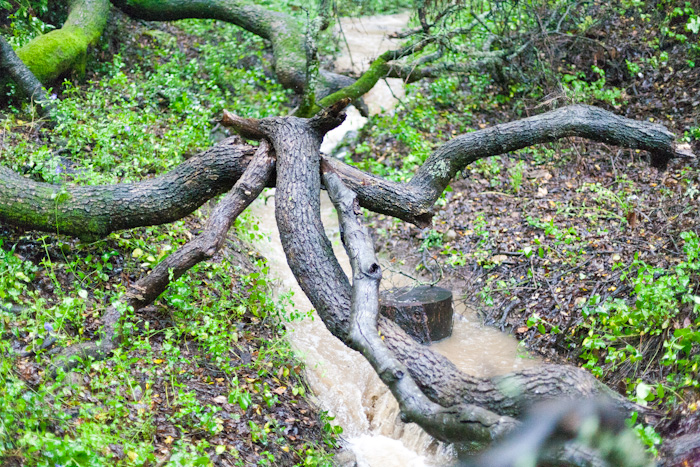
The long, deep, unprecedented rumble from the sea—and a sudden prolonged hysterical shriek from Old Jenkins...
They ran to the window, and saw the waves—and in a handful of seconds Ferrara had rushed from the front window to the back stairs.
The creaking staircase led to the second story of the tavern building and the splintery sun deck, which they hadn’t used in years. Ferrara led the others by at least four steps, rushing to the top of the stairs; he unlocked the metal door from inside with a twist of the rusty lock-knob, shouldered through onto the sun roof, blinking in the sudden light.
Hearing—and feeling—the tympanic roll of the oncoming wall of water, Ferrara climbed up the steeply angled roof behind the sundeck, his feet slipping on mossy wooden shingles. Got to the top, straddling it, just in time, heart hammering, wheezing, to turn and see a mountain range of seawater, more than a hundred feet high, rising up, up...
It came booming toward him, stampeding across the beach below the town, the churning at its base like countless running white feet...
Some beachcomber in its path screamed hoarsely, the scream cut off as the wave swept the man up, tumbled him, and swallowed him, the onrushing wall of water—a hundred feet high—not appreciably slowing as it hit the beach, seeming to lean eagerly toward the town as it smashed onward, across the highway, coming at the buildings facing the sea, including the Bobbing Buoy Bar and Barbecue…
Then it was looming over Lon Ferrara, pushing a cold wind ahead of it that made Ferrara’s clothing flap. The great wave was dark brown at the base; then tan, then transparent green, brilliant white, flecked with flotsam, veined with seaweed…
The wave. A dirty but translucent mountain casting a shifting mix of reflected light and gloom.
Monumentally towering, beyond time, it threw a chill, fulsome shadow across Freedom, California...
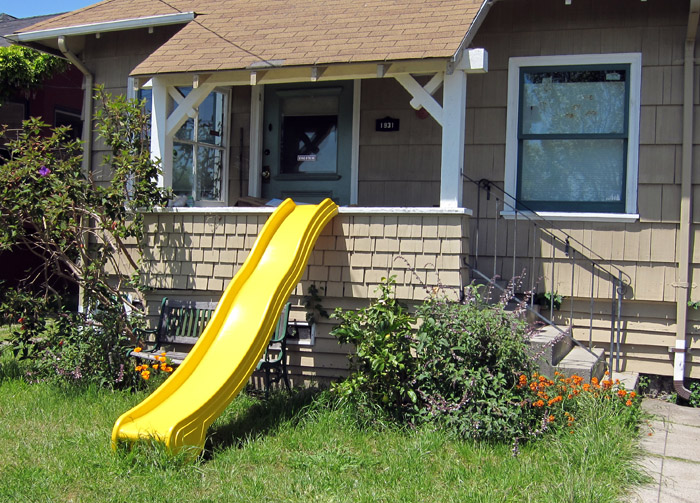
Russ was watching from the balcony; his dad hurried out, and Pendra was watching from the ground under the balcony, and they all three stared down the hillside at the wall of water, its bigness on an apocalyptic scale, its crest seeming to hang over the highway, and the streets spread out below them—to just hang there like a cobra poised to strike…for a single long second.
It took him a moment to fully comprehend. A tsunami…
And then the wave came crashing into the town with a growl within a rumble within thunder, all bursting into one master roar. The ground shook with it; a wind was forced up the hill toward them, smelling of sea and petroleum.
“Oh God, oh no,” Dad muttered. Staring.
Seeing the vast wave slam the town Russ thought of a really big, muscular man standing in front of a miniature model of a village on a table, the man suddenly sweeping his arm into the little buildings, bashing them to flinders with one sideways massive swipe, crushing one little house into the next…A giant, smashing the town…
Instinctively, he raised the binoculars to his eyes…
It was more than Russ could take in. The Pacific Ocean had displaced the town, below the hill: every building along the beachside highway was submerged, or sucked from its foundation like plants torn up by the roots. And the wave—the word seemed inadequate, it was more like the muscular shoulders of the ocean, lifting up—this immense surge from the deeps was changing its color as it scooped up dirt and debris, so the trough behind the wave became the color of an old bruise.
Russ became aware of another sound, through the ongoing roar: a thin, many-sourced warbling. Then he realized he was hearing screams. They were attenuated from here, icicle-thin: hard to hear, yet icily penetrating the malicious bellowing of the mountainous wave.
And the bodies…
As the wave splintered and tossed the line of boxy wooden buildings, moving on to the next row of houses, Russ saw bodies—tiny figures at this distance—flipped up as if the wave were throwing them over its shoulder, like a big vicious dog killing its way through trapped rodents. It was impossible to tell if any were still living, or if their apparent flailing was driven by the churning, gray-brown element. They were just more debris mixed in with the shattered timbers, drifting doors, whole sections of wall, furniture, cars upside down, unrecognizable objects rising and subsiding—as the wave moved on, plowing over the next street and the next, redefining shapes as it went human artifacts liquefying into the chaos of the dirty living sea.
The water went from dark brown to black with debris; the odd shapes of broken walls, random panels of wood, debris that had lost all identify merged into one grinding irregular mass, bullying its way forward. The tsunami heaved against the hills like a football player trying to tackle a bigger man, the tackler flying asunder in dirty foam.
And here came another great wave, not quite as big but as forceful, followed quickly, picking up new flotsam: a minivan spinning like an overturned turtle, a man trying to climb onto it, slipping back, vanishing in a whirlpool; logs that had been at sea for years were hurled like javelins, crunching into the houses on the hill. Houses collapsed down into the hysterical sea with a squealing and wrenching Russ could hear even at this remove, the shattered faces of buildings disgorging furniture and people. And the wave moved onward, upward...
“Dad—” Russ asked suddenly. “—should we run?”
“If we do, we... we’d be on lower ground. This is the highest ground around here. Don’t think we’ll need the roof...”
And then the entire town, below their vantage, was engorged by the sea—except for narrow, peaked building, close to the submerged highway, where a group of people clung to a roof. The structure was on a rocky spur of land, significantly higher than the rest of the buildings, at the edge of the main street frontage. The tidal wave swept over it—and a few people remained, afterwards.
But scores of other bodies were whipped about in the white and brown water, entwined with crackling power lines and kelp and carpets…The tsunami, grinding everything before it with the bladelike pieces of what it had destroyed before, seemed to erase life as it pushed ahead—but Russ was impressed, felt a small blossom of hope in his breast when he made out several people climbing from the swamping debris, climbing onto a free-floating wooden two-car garage. Most down there, clearly, would be drowned, crushed, osterized. But some lived; some struggled free of the vector of chaos...
A mist rose from the crashing of the wave like smoke over a forest fire. Everywhere, dogs barked, birds shrieked, and the hillsides thumped and echoed with sound.
And piercing through the bass notes was the persistent keening of the victims.
Russ looked down and saw it was Pendra, standing there transfixed by the sight of the giant waves, hugging herself and shaking her head.
“Up here, Pendra!” he yelled. “Better come up here!”
Yet another wave had piled atop the others to slosh up the hill toward them, coming closer than the others before. The increasingly chaotic waves were like great gelatinous creatures charging, crashing into trees and houses, breaking up into competing waves that thrashed back and forth, pitching pieces of buildings. A couple of small boats and one badly broken yacht and one dead horse and an overturned pickup truck, all were tumbled together with floating roof of a two-bedroom house—and it was all coming up the hill at them, rising, mounting up to make them part of it, as if was a natural process that was supposed to happen the way rain precipitates into a rainstorm, and rivers form; as if it was supposed to crush them into this boiling liquefaction of the town.
Russ watched, hypnotized, helpless, as it came up for them. How could this follow-on wave be reaching higher than the tsunami itself? All the rules were broken. The fat, rogue wave came on, rearing colossally…
…And finally broke, just before it reached the apartment building. And now Pendra was onto the balcony beside him, shouting and almost inaudible in the massive noise of the displaced sea, the sounds of compact cars flung to crash through rooftops just about eighty feet below them. Two flowerpots fell off the corners of the balcony, with the reverberation of this new wave’s slam; a window cracked and dust sifted from the edge of the roof overhead.
The rapacious last wave was collapsing. Still it refused to back away, gray and sickly, green and filthy, still raging as if it longed to reach them. At last it began to suck back, back toward the open sea.
People were drawn with it—they were some distance away but he saw them clearly, living people thrashing in terror as the wave recoiled. The ocean was swallowing its victims. For a time it roiled restlessly in place, seemed reluctant to pull back.
Only one building was left partly standing along Highway One in Freedom, California. It was the tallest building, three stories, once housing Ferrara’s Bobbing Buoy Bar and Barbecue. Only part of the roof remained.

Lon Ferrara, soaking wet, shivering, crusted in salt, was straddling the spine of the peaked roof, his brother and a woman clinging nearby. Ferrara was asking himself if he was dreaming. He was feeling like he was at a significant remove from real. The cold wind, the spray, was cutting at him, but he didn’t feel it much; his hands, clamping the wooden shingles, were just dead things at the end of his arms. The wave had passed over him and had pressed him crushingly onto the roof and then tried to pull him free. Tremendous pressure, but he’d wedged between a drain pipe and a deck post and the roof had been slightly turned aside and a lot of the pressure had been turned from him too and then the water had receded, to just below his perch…
He did feel one thing: The sensation of smallness, of inconsequentiality, was like a big burning hole in his middle.
The bar was destroyed; the guts of the building had been literally sucked out from under him. He fully expected this roof to collapse too. It was almost all that remained, except the upright teak beams that supported its frame, hard timber extracted from an old ship—the beams had withstood the tsunami, holding the peaked roof over the sun deck. The walls were gone, but the beams, the frame of the building, was still there. The deck itself had washed away in the thunderous surge—the massive wave had been weakened in this area by the rising slope of the sand, the tidal break of boulders lining the beach, the highway, the spur that the bar stood on—and an empty semi-truck that had been passing at just the right moment, right for Ferrara but fatal for the truck, which had been kicked over on its side and spun, slammed into the building housing the Surf Shop and the Gift Shoppe and Amir’s Frozen Yogurt, all of them stoved-in and reduced to floating debris. Amir himself had gone floating by, face down, limp in the agitated surf. A dead sea lion, cloven almost in half, rippled bloodily by, a few yards from Ferrara’s feet...
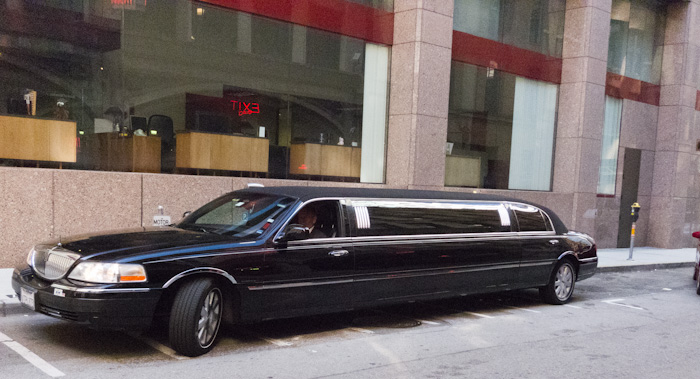
They sat on the balcony for a long time, in white-plastic chairs, Russ and Pendra and Dad, staring down the hill as if someone had slapped them all repeatedly until they could no longer think or speak or move. Sat there, awash in the raw, overwhelming smell of the flooding; watching the waters slowly, slowly recede; looking at a town turned inside out, its interior broken up and scattered below them. Hearing the hissing, the crackling…
Russ realizing that, somehow, fires had broken out, just above the waterline, in many places. Fire seemed a strange offspring of a tidal wave. The smell of smoke mingled with the reek of displaced sewage and decaying fish.
But finally, Pendra said, “My Gram... My Gram went to the store. She didn’t have any sodas for guests and she went to the store right before…” She put a hand over her mouth and her eyes teared up again and Russ put his hand on her shoulder.
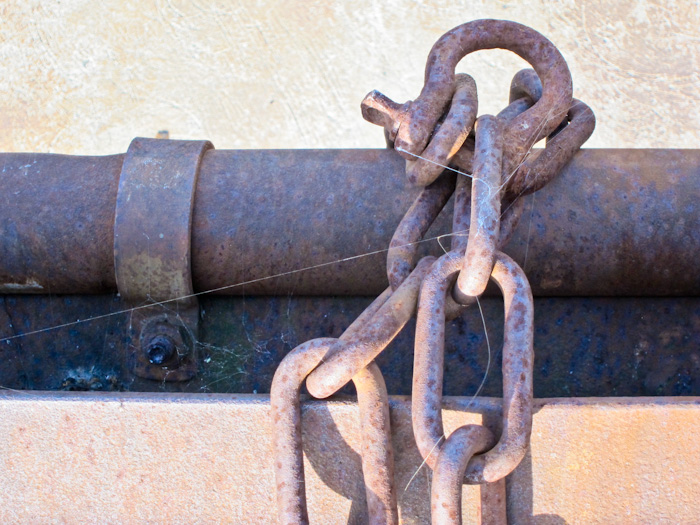
Jill came to herself climbing up a hill.
She couldn’t remember, exactly, how she’d come here. She’d been clinging to the roof of the bar with Mario and Lon. People had died, nearby—almost within reach. The cold, hungry wave had washed over them and she’d clung stubbornly thinking No no no.. Then it had receded somewhat, but its gray waves jumped around them like angry wolves. She’d tried to shout something to Mario Ferrara—not sure what—then she’d lost her hold and slipped into the water. No one had tried to pull her out. She’d swallowed water, flailed to the surface, spitting up burning salt water. She’d dog paddled—then clung to something slippery and wooden. A post? She’d seen bodies floating face down. She’d lost her grasp on the post and forced herself to keep paddling. She’d thought, I can swim, dammit. And she’d made herself stretch out into the long strokes that she used at the Y to do laps. Eventually she’d found herself climbing up out of the water, onto a street...
Someone was screaming in a building nearby her, now. Water was pouring out its broken windows as if from a dam’s spillway. Jill just kept climbing...
She was barefoot, covered in slime, shaking with cold, her hair plastered to her head, as she struggled up the hill. She was not so far above the thrashing water that still sucked at the lower, beachside part of town. What had become of her shoes? She didn’t know. Her feet hurt but somehow it didn’t seem to matter.
Jill stepped delicately over debris. A twisted car fender; a bent mailbox; a broken window pane, the whole frame lying in the street; moraines of shattered glass; beachtoys—something ironic in the beachtoys, lying here, amongst the seaweed and trash in the street, and so close to that dead child. The child was just more debris. She knew the boy was dead because his head was turned around backwards on his neck and his eyes were staring into emptiness and a crab was walking across his forehead. She reached down and flicked the crab away, though it seemed pointless to bother.
A filthy, beach towel reading FREEDOM CALIFORNIA—FIND THE NEW FREEDOM ! had been plastered by the wave to the windshield of a small car. Water bubbled out the edges of the Honda’s partly closed windows—still filled with water, the little two-door sedan had become a dirty aquarium on wheels, with the pale, decorated by the dead driver inside it, brown hair floating like Sargasso weed over his head; the dead man staring through the water, out the windshield, as if amazed that the traffic light never quite changed.
Find the New Freedom! Irony –and it struck Jill that she had written an article warning about all this, several years earlier, when the clustershakes started. She’d written an article—but she hadn’t moved away from the coast. Mocking irony....
“Around the end of the last Ice Age, there was a great increase in seismicity along the margins of the ice sheets,” Professor Garland said. “We’ve got a clearcut geological record of that sudden rise in seismicity. That tectonic change in pressure, in turn, triggered these huge submarine landsides— which generated enormous tsunamis...So yes, Global Warming can lead to volcanoes, earthquakes, and massive tsunamis...”
She’d blithely typed those words, published the article in the paper—that was before Ferrara had taken it over—and everyone had ignored it. And she’d ignored her own article, her own warning—she’d stayed right here.
And here she was...stepping over a drowned dead woman as she climbed the hill I her bare feet...
Suddenly fatigue washed over Jill, and she was shaking too much to keep walking. She stumbled toward a small passage between two buildings on the left. She stepped over some driftwood and when her foot came down, her ankle seemed to give out, her leg wouldn’t hold her up, and she pitched forward onto the wet pavement.
It was Russ and Pendra who found her and helped her upstairs.
About the Author
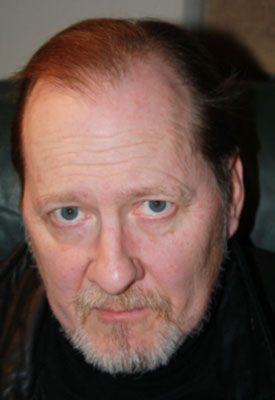
John Shirley's recent works include the best-selling Bioshock: Rapture, the story collection In Extremis, the novels Bleak History and The Other End and the forthcoming near-future disaster novel Everything is Broken, from which this story is adapted.
John's earlier books include the novels Eclipse, Corona, Black Glass: The Lost Cyberpunk Novel, City Come A-Walkin' , and Crawlers.
He was one of the original cyberpunk authors and has collaborated with Bruce Sterling, Rudy Rucker and William Gibson. He won The Bram Stoker Award for the story collection Black Butterflies. He was co-screenwriter of the film The Crow, has written scripts for television series including Deep Space Nine and VR5.
Post a comment on this story!